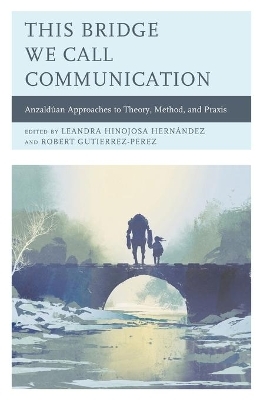
This Bridge We Call Communication
Lexington Books (Verlag)
978-1-4985-5880-8 (ISBN)
This Bridge We Call Communication: Anzaldúan Approaches to Theory, Method, and Praxis explores contemporary communication research studies, performative writing, poetry, Latina/o studies, and gender studies through the lens of Gloria Anzaldúa’s theories, methods, and concepts. Utilizing different methodologies and approaches—testimonio, performative writing, and interpretive, rhetorical, and critical methodologies—the contributors provide original research on contexts including healing and pain, woundedness, identity, Chicana and black feminisms, and experiences in academia.
Leandra H. Hernández is independent scholar and teaches communication courses at National University, Trident University International, and the University of Houston. Robert Gutierrez-Perez is assistant professor of culture and communication in the Department of Communication Studies at the University of Nevada, Reno.
Part I: Healing the Wounds: (Re)imagining Borderlands Theory
Chapter 1: “Using Testimonios to Untame Our Silent Tongues: Exploring our Experiences of Child Sexual Abuse Through an Anzaldúan Perspective,”
Nivea Castañeda
Chapter 2: “Testimonio as a Queer Puente for Healing,”
Manuel Alejandro Pérez
“Make America Great Again,”
Robert Gutierrez-Perez
Chapter 3: “Fronteras Toxicas: Toward a Borderland Ecological Consciousness,”
Carlos Tarin
“Dolores,”
Masha Sukovic
Part II: The Coyolxauhqui Imperative: Health Communication, Disability Studies, Pain, and Healing
Chapter 4: “Facing Tlahtlacolli (Microaggressions) with Nepantla and Conocimiento: A Xicana Epistemological Approach,”
Sarah Amira de la Garza
Chapter 5: “A Letter to My Hija: Anzaldúa’s Coyolxauhqui Imperative, Your Bisabuela’s Withering Body, and the Life-Affirming Possibilities of Woundedness,”
Luis Manuel Andrade
Chapter 6: “I take something from both worlds”: An Anzaldúan Analysis of Mexican-American Women’s Conceptualizations of Ethnic Identity,”
Leandra Hinojosa Hernández
Part III: Theorizing Nepantla: Creative Ethnographies on the Path of Conocimiento
Chapter 7: “Communicating Nepantla: An Anzaldúan Theory of Identity,”
Sarah De Los Santos Upton
Chapter 8: “Between Worlds: A Personal Journey of Self-reflection While on the Path of Conocimiento,”
Edmundo M. Aguilar
Chapter 9: “Remembering Gloria Anzaldúa Globally Through A Documentary Altar: ALTAR Cruzando Fronteras, Building Bridges,”
Diana I. Bowen
Part IV: Critical/Cultural Rhetorics of Ambiguity and Hybridity
Chapter 10: “Sweetening the Pot: Culinary Adventures in Hybridity,”
Stephanie L. Gomez
“La Dueña de la Casa,”
Masha Sukovic
Chapter 11: “A Tolerance for Ambiguity or the American Dream: Using Anzaldúa to Disrupt and Reclaim Latina Lives from Multicultural Feminism,”
Sara Baugh-Harris and Bernadette Marie Calafell
Part V: Women of Color and Radical Coalition Building
“Whispers in the Dark: A Collection of Poems,”
Shantel Martinez
Chapter 12: “Black Women and Girls Trending: A New(er) Autohistoria-Teoría,”
Tara L. Conley
Chapter 13: “Rasquache Cyborgs and Borderlands Aesthetics in Alex Rivera’s Sleep Dealer,”
Alexandrina Agloro
Chapter 14: “Gloria Anzaldúa, Audre Lorde, & Topographies of Anger,”
Rachel Alicia Griffin
Part VI: Anzaldúan Approaches to Critical (Communication) Pedagogy
“I Get It from My Mother,”
Robert Gutierrez-Perez
Chapter 15: “Building Community, Decolonizing Spirituality, and Women of Color Feminism: Applying Gloria Anzaldúa in and out of the Classroom for Healing and Empowerment,”
Xamuel Bañales
Chapter 16: “Carrying Gloria on My Back: A Pedagogic and Research Journal,”
Luis Gabriel Sanchez Rose
Chapter 17: “A Crack to Speak Out From: Performing Coalitional Politics Through Dialogue, Listening, and Reflexivity,”
Robert Gutierrez-Perez and Bedilia Ramirez
Chapter 18: “Becoming a Bridge in/through Critical Communication Scholarship:
Meditations on the Affective Afterlife of Cultural Normativities,”
Gust A. Yep
| Erscheinungsdatum | 17.05.2021 |
|---|---|
| Co-Autor | Alexandrina Agloro, Edmundo M. Aguilar, Luis M. Andrade, Xamuel Bañales, Sara Baugh-Harris |
| Verlagsort | Lanham, MD |
| Sprache | englisch |
| Maße | 154 x 218 mm |
| Gewicht | 603 g |
| Themenwelt | Sozialwissenschaften ► Ethnologie |
| Sozialwissenschaften ► Kommunikation / Medien ► Kommunikationswissenschaft | |
| Sozialwissenschaften ► Soziologie | |
| ISBN-10 | 1-4985-5880-1 / 1498558801 |
| ISBN-13 | 978-1-4985-5880-8 / 9781498558808 |
| Zustand | Neuware |
| Haben Sie eine Frage zum Produkt? |
aus dem Bereich


